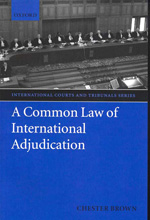A Common Law of international adjudication
- ISBN: 9780199563906
- Editorial: Oxford University Press
- Fecha de la edición: 2009
- Lugar de la edición: Oxford. Reino Unido
- Colección: The International Courts and Tribunals Series
- Encuadernación: Rústica
- Medidas: 24 cm
- Nº Pág.: 303
- Idiomas: Inglés

Recent years have seen a proliferation of international courts and tribunals, which has given rise to several new issues affecting the administration of international justice. This book makes a signification contribution to understanding the impact of this proliferation by addressing one important question: namely, whether international courts and tribunals are increasingly adopting common approaches to issues of procedure and remedies. This book's central argument is that there is an increasing commonality in the practice of international courts to the application of rules concerning these issues, and that this represents the emergence of a common law of international adjudication. This book examines this question by considering several key issues relating to procedure and remedies, and analyses relevant international jurisprudence to demonstrate that there is susbstantial commonality. It goes on to look at why international courts are increasingly adopting common approaches to such questions, and why a greater degree of commonality may be found with respect to some issues rather than others. In doing so, light is shed on the methods adopted by international courts to engage in the cross-fertilization of legal principles. The emergence of a common law of international adjudication has important practical and theoretical implications, as it suggests that international courts can also devise common approaches to the challenges that they face in the age of proliferation. It also suggests that international courts do not generally operate as self-contained regimes, but rather that they regard themselves as forming part of a community of international courts, therefore having positive implications for the development of an truly international legal system.







